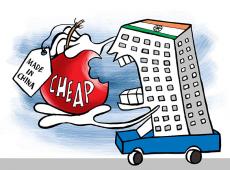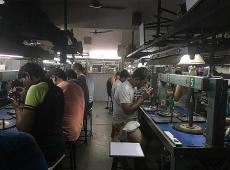New Safety Regulations Impact MSMEs: GTRI
By Rediff Money Desk, New Delhi Sep 09, 2024 16:12
New safety regulations for machinery and electrical equipment in India are expected to impact MSMEs, delaying imports and affecting domestic production. GTRI suggests extending compliance timelines and providing support to the sector.
New Delhi, Sep 9 (PTI) The new safety regulations for machinery and electrical equipment issued by the government will affect domestic production by the MSME segment and delay the import of essential equipment, think tank GTRI said on Monday.
It suggested extending the compliance timeline, implementation in a phased manner, and extending government support to help the industry deal with the regulations.
It said that while large corporations may have the resources to meet new safety standards, MSMEs face unique challenges in complying with the Ministry of Heavy Industry's (MHI) order.
These challenges include financial, technical, and infrastructural constraints, making compliance a significant burden for small businesses, the Global Trade Research Initiative (GTRI) said.
On August 28, 2024, the Ministry introduced the Machinery and Electrical Equipment Safety (Omnibus Technical Regulation) Order, 2024, which is set to take effect on August 28, 2025.
These comprehensive regulations bring in stringent safety standards for machinery and electrical equipment manufactured or imported into India, aimed at aligning Indian safety practices with global norms, it said.
It added that the new rules are expected to have far-reaching consequences for manufacturers,
particularly Micro, Small, and Medium Enterprises (MSMEs), which make up 90 per cent of the estimated 1,50,000 manufacturers that will be affected.
It also said that the regulations cover more than an estimated 50,000 types of machinery, including
key industrial equipment like pumps, compressors, centrifuges, cranes, looms, metal-cutting tools, transformers, and switchgear, which fall under 463 tariff lines or product categories.
In FY 2024, India's imports in these tariff lines amounted to USD 25 billion, with China accounting for 39.1 per cent of that value. India also exported USD 17.7 billion worth of machinery in the same period.
These regulations apply to both machinery and their parts or subassemblies and will require manufacturers to comply with the safety and conformity standards set forth by the Bureau of Indian Standards (BIS).
"Although the ministry order does not apply to export-oriented machinery, this exemption may not be helpful in practice, as most firms manufacture goods for both domestic and export markets. Therefore, businesses will still need to meet full BIS certification requirements for their entire product range," GTRI Founder Ajay Srivastava said.
He said that to ensure the successful implementation of the new safety regulations, a coordinated strategy involving the government, industry associations, and firms is necessary.
Anil Jauhri, ex-CEO, the National Accreditation Board for Certification Bodies (NABCB), said that a mechanism for certifying competent technical professionals is essential to help industries implement these new standards.
"While the Indian National Strategy for Standardisation (INSS) emphasises counselling and training, no action has been taken to certify technical consultants and trainers. This has left industries struggling with implementation," Johri said.
It suggested extending the compliance timeline, implementation in a phased manner, and extending government support to help the industry deal with the regulations.
It said that while large corporations may have the resources to meet new safety standards, MSMEs face unique challenges in complying with the Ministry of Heavy Industry's (MHI) order.
These challenges include financial, technical, and infrastructural constraints, making compliance a significant burden for small businesses, the Global Trade Research Initiative (GTRI) said.
On August 28, 2024, the Ministry introduced the Machinery and Electrical Equipment Safety (Omnibus Technical Regulation) Order, 2024, which is set to take effect on August 28, 2025.
These comprehensive regulations bring in stringent safety standards for machinery and electrical equipment manufactured or imported into India, aimed at aligning Indian safety practices with global norms, it said.
It added that the new rules are expected to have far-reaching consequences for manufacturers,
particularly Micro, Small, and Medium Enterprises (MSMEs), which make up 90 per cent of the estimated 1,50,000 manufacturers that will be affected.
It also said that the regulations cover more than an estimated 50,000 types of machinery, including
key industrial equipment like pumps, compressors, centrifuges, cranes, looms, metal-cutting tools, transformers, and switchgear, which fall under 463 tariff lines or product categories.
In FY 2024, India's imports in these tariff lines amounted to USD 25 billion, with China accounting for 39.1 per cent of that value. India also exported USD 17.7 billion worth of machinery in the same period.
These regulations apply to both machinery and their parts or subassemblies and will require manufacturers to comply with the safety and conformity standards set forth by the Bureau of Indian Standards (BIS).
"Although the ministry order does not apply to export-oriented machinery, this exemption may not be helpful in practice, as most firms manufacture goods for both domestic and export markets. Therefore, businesses will still need to meet full BIS certification requirements for their entire product range," GTRI Founder Ajay Srivastava said.
He said that to ensure the successful implementation of the new safety regulations, a coordinated strategy involving the government, industry associations, and firms is necessary.
Anil Jauhri, ex-CEO, the National Accreditation Board for Certification Bodies (NABCB), said that a mechanism for certifying competent technical professionals is essential to help industries implement these new standards.
"While the Indian National Strategy for Standardisation (INSS) emphasises counselling and training, no action has been taken to certify technical consultants and trainers. This has left industries struggling with implementation," Johri said.
Source: PTI
Read More On:
DISCLAIMER - This article is from a syndicated feed. The original source is responsible for accuracy, views & content ownership. Views expressed may not reflect those of rediff.com India Limited.
You May Like To Read
TODAY'S MOST TRADED COMPANIES
- Company Name
- Price
- Volume
- Entero Healthcare So
- 1,368.00 (+ 4.15)
- 2400000
- Nuvama Wealth Manage
- 6,800.00 (+ 0.44)
- 2209907
MORE NEWS

Gulf Oil Promoter Sells 4% Stake for Rs 263 Crore
Gulf Oil International Mauritius Inc. sold a 4% stake in Gulf Oil Lubricants India for...

Zaggle Acquires Stakes in Span Across IT &...
Fintech firm Zaggle invests Rs 48 crore in Span Across IT Solutions and Mobileware...

Swiggy Files Updated IPO Papers: Eyes Rs 3,750 Cr
Swiggy files updated IPO papers with Sebi, aiming to raise Rs 3,750 crore through fresh...












 © 2024 Rediff.com India Limited. All rights reserved.
© 2024 Rediff.com India Limited. All rights reserved.